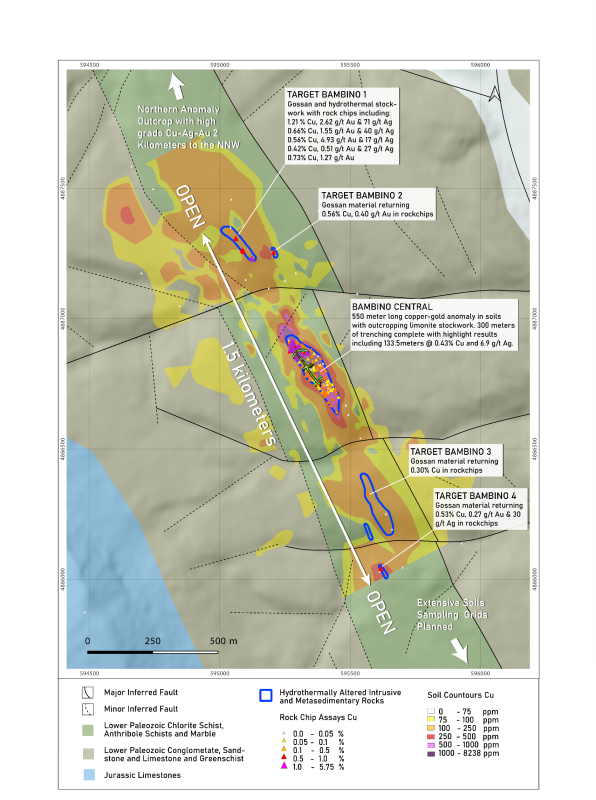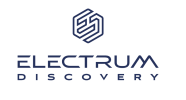 |
|||||||||
Vancouver, Canada, November 5, 2024 – TheNewswire – Electrum Discovery Corp. (“Electrum” or the “Company“) (TSX-V:ELY |FRA:R8N |OTC:ELDCF) is pleased to announce results from its 300 meter trench sampling program at its Timok East copper-gold project (“Timok East“) in Serbia.
|
Highlights:
|
Dr Elena Clarici, CEO and President of Electrum commented: “The trenching results fit the mineralization pattern we have found over 3km strike length at Timok East and importantly align in metals’ mineralization and grade with several large, neighboring copper-gold deposits. The results from this trenching program reinforce Timok East’s potential to host a significant copper-gold mineralized system associated with the well-documented deposits in the Timok district and, together with planned geophysical survey makes us ready for our maiden diamond drill campaign.”
Trenching along the strike of the Bambino Central anomaly has exposed a north-northwest striking zone of limonite-stockwork mineralization within argillic-silicic altered intrusive and metasedimentary rocks over 146.0 meters in trench TR02, indicative of the high-level oxidized portion of a large hydrothermal mineralizing system.
Assay results from within the 146.0 meters of alteration confirm significant copper mineralization within the system, with results including a weighted average of 133.5 meters @ 0.43% Cu and 6.9 g/t Ag in TR02, along strike complemented by several narrower, gold-dominant zones including 1.5 meters @ 2.9 g/t Au, 0.06 % Cu and 20 g/t Ag, suggesting potential overprinting by a secondary gold system.
Regional sampling reported earlier shows higher silver grades approximately 500 m to the northwest, in potentially more distal mineralization from the core of the system by modelling from other similar porphyry type districts.
Figure 1: Geology map with rock chip and trench samples across the Bambino Target.
Three additional cross cutting trenches were opened east-northeast, all intercepting significant copper and gold mineralization, including 24.0 meters @ 0.21% Cu and 4.2 g/t Ag in TR01, 13.5 meters @ 1.72% Cu and 1.6 g/t Ag in TR04 and 22.5 meters @ 0.26% Cu and 2.6 g/t Ag in TR03. Trenches TR01 and TR03 ended to the east in hydrothermally altered metasediments and stockwork, indicating the system is open to the east. Over 400 meters strike of the highest-grade soil anomalism at Bambino central (>500 ppm Cu) remains untested in the sub-surface environment and the true width of the system is not yet known. The trench results at Bambino are interpreted to be structurally controlled and show geological and geochemical similarities with significant resource stage copper-gold deposits discovered within the Timok region.
Trenching was successful in providing critical information on the grade, geometry, alteration and mineralization style at Bambino and will be followed up with a tight IP survey to define the orientation and potentially higher-grade hypogene portion of the mineralized body at depth ahead of drill targeting.
Trench Details
Trench TR02 was opened over 153.0 meters length, along the NNW striking ridge aligning with the highest-grade copper anomaly in soils. This trench revealed consistent limonite stockwork material in hydrothermally altered rock across the trench ending to the north and south in hydrothermal stockwork. Secondary copper minerals Malachite and Azurite were encountered on the northern slope of the trench, coinciding with a drop in elevation, potentially representing supergene enrichment processes.
Significant weighted average copper dominant intervals from TR02 include:
133.5 meters @ 0.43% Cu and 6.9 g/t Ag from 0.0 meters,
Including 64.5 meters @ 0.76 Cu and 5.3 g/t Ag from 0.0 meters, and
10.5 meters @ 0.21% Cu and 5.3 g/t Ag from 142.5 meters.
Significant gold bearing intervals were also intercepted within the broader copper zones, including:
1.5 meters @ 2.9 g/t Au, 20 g/t Ag and 0.06% Cu from 64.5 meters, and
6.0 meters @ 0.18 g/t Au, 13.3 g/t Ag and 0.35% Cu from 96.0 meters.
Trench TR01 was opened over 40.5 meters striking roughly WSW across the southern portion of the trenched area. Copper bearing limonite stockwork material was encountered from 15-30.5 meters in the trench within hydrothermally altered argillic altered rock with pockets of increasing silicification. The stockwork material was heavily oxidized with no secondary copper present, suggesting sulfide leaching during the weathering process. Copper-bearing Silicified metasedimentary rock with minor quartz limonite stringers was encountered from 9 – 15 meters.
Significant weighted average copper dominant intervals from TR01 include:
24.0 meters @ 0.21% Cu and 4.2 g/t Ag from 12.0 meters.
Significant gold bearing intervals were also intercepted within the broader copper zone, including:
1.5 meters @ 0.13 g/t Au and 18.0 g/t Ag and 0.21% Cu from 24.0 meters.
Trench TR03 was opened over 40 meters striking roughly WSW across the central portion of the trenched area. Copper bearing limonite stockwork material was encountered from 6.0- 33.0 meters in the trench within argillic altered rock with pockets of increasing silicification. The stockwork material was heavily oxidized with no secondary copper present, suggesting sulfide leaching during the weathering process. The trench ended in coper mineralized clay altered metasediments in the east.
Significant weighted average copper dominant intervals from TR03 include:
22.5 meters @ 0.26% Cu and 2.6 g/t Ag from 0.0 meters.
Significant gold bearing intervals were also intercepted within the broader copper zone, including:
4.5 meters @ 1.49 g/t Au and 6.9 g/t Ag and 0.16% Cu from 13.0 meters.
Trench TR04 was opened over 69 meters striking roughly WSW across the northern-most portion of the trenched area. copper bearing limonite – copper oxide stockwork material was encountered from 34.5 – 52.5 meters, within a mixture of hydrothermally altered argillic altered intrusive and silicified metasedimentary. Silicified metasedimentary rock with minor quartz limonite and calcite stringers was encountered from 0 – 34.5 meters. Oxidizes metasedimentary units were mapped from 52.5 – 69 meters.
Significant weighted average copper dominant intervals from TR04 include:
1.5 meters @ 0.51% Cu, 6.3 g/t Ag and 0.16 g/t Au from 30.0 meters, and
13.5 meters @ 1.72% Cu and 1.6 g/t Ag from 39.0 meters.
|
Trench ID |
From (m) |
To (m) |
Interval (m) |
Cu % |
Ag g/t |
Au g/t |
|
TR01 |
12.0 |
36.0 |
24.0 |
0.21 |
4.2 |
– |
|
*Including |
24.0 |
25.5 |
1.5 |
0.21 |
18.0 |
0.13 |
|
TR02 |
0.0 |
133.5 |
133.5 |
0.43 |
6.9 |
– |
|
Including |
0.0 |
64.5 |
64.5 |
0.76 |
5.3 |
– |
|
*Also Including |
64.5 |
66.0 |
1.5 |
0.06 |
20 |
2.90 |
|
*Also Including |
73.5 |
75.0 |
1.5 |
0.04 |
14 |
0.93 |
|
*Also Including |
96.0 |
102.0 |
6.0 |
0.35 |
13.3 |
0.18 |
|
And |
142.5 |
153.0 |
10.5 |
0.21 |
5.3 |
– |
|
TR03 |
0.0 |
22.5 |
22.5 |
0.26 |
2.6 |
– |
|
*Including |
13 |
17.5 |
4.5 |
0.16 |
6.9 |
1.49 |
|
TR04 |
30.0 |
31.5 |
1.5 |
0.51 |
6.3 |
0.16 |
|
And |
39.0 |
52.5 |
13.5 |
1.72 |
1.6 |
– |
Table 1: Table reporting significant copper, silver and gold intercepts from the recent trench sampling at Central Bambino. *highlights overprinting gold dominant intervals.
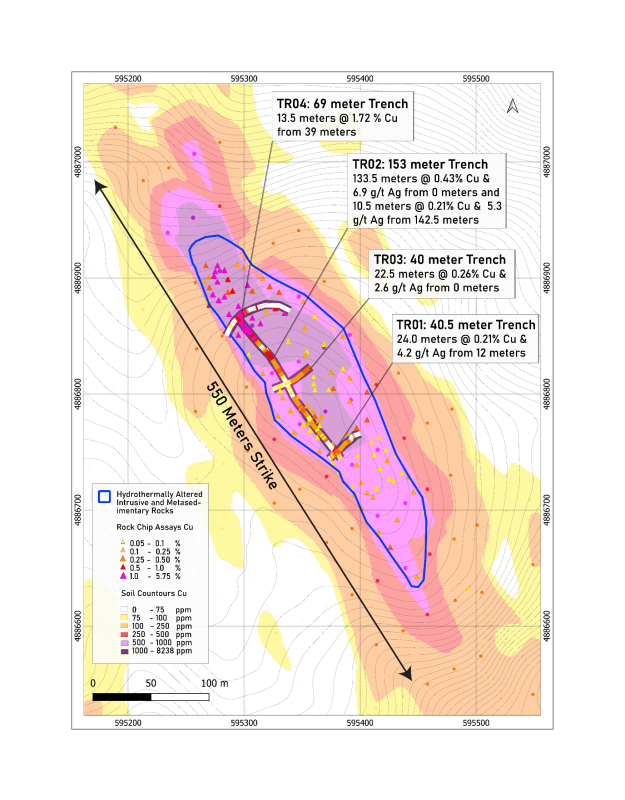
Click Image To View Full SizeFigure 2: Map showing soil, rockchip and trench sample copper assay results from the Bambino Central target.
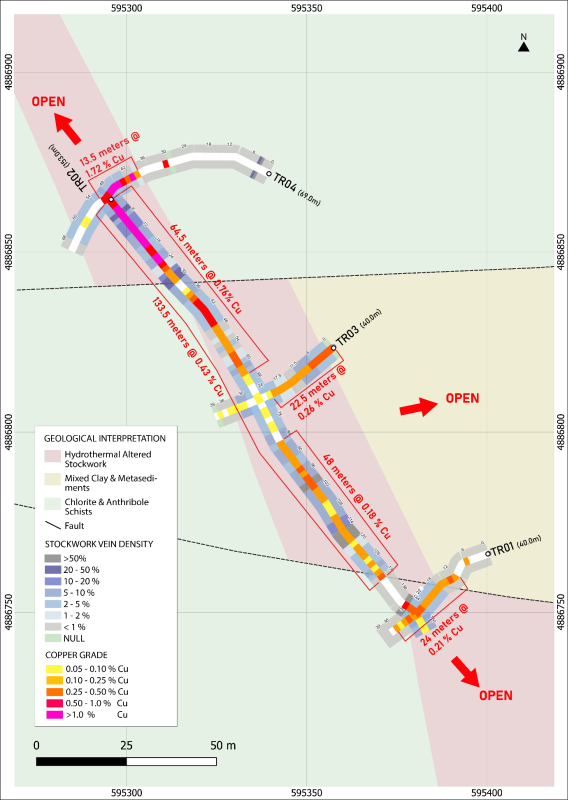
Click Image To View Full SizeFigure 3: Plan-view of the trenching copper assay results, with mapped trench stockwork vein density and geological interpretation.
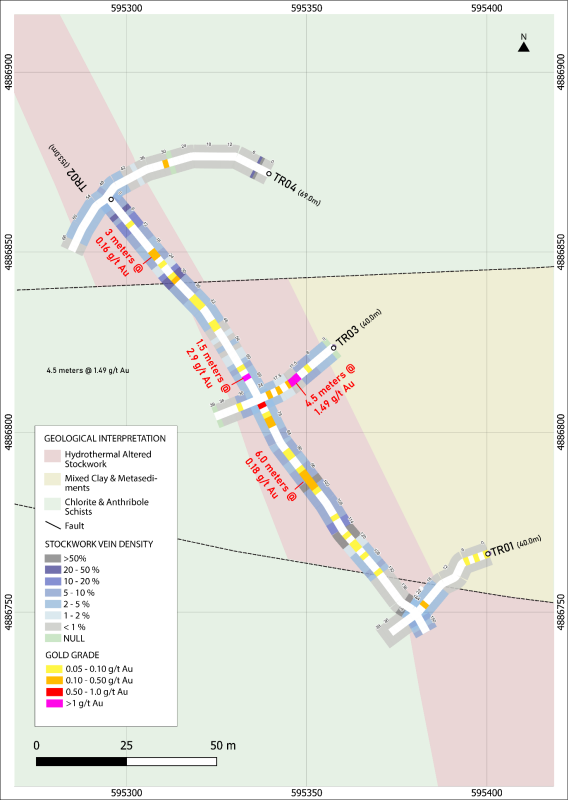
Click Image To View Full SizeFigure 4: Plan view of the trenching gold assay results, with mapped trench stockwork vein density and geological interpretation.
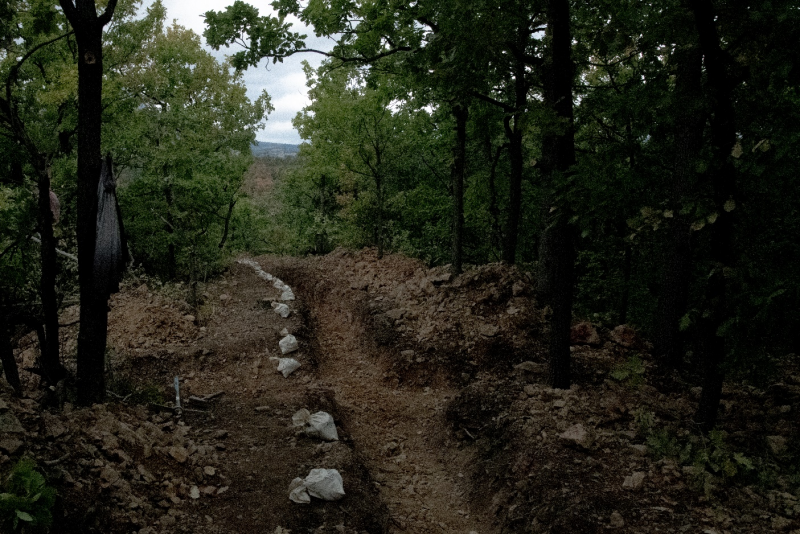
Click Image To View Full SizeFigure 5: Photograph of cross section between trench TR02 and TR03 taken during trench sampling.
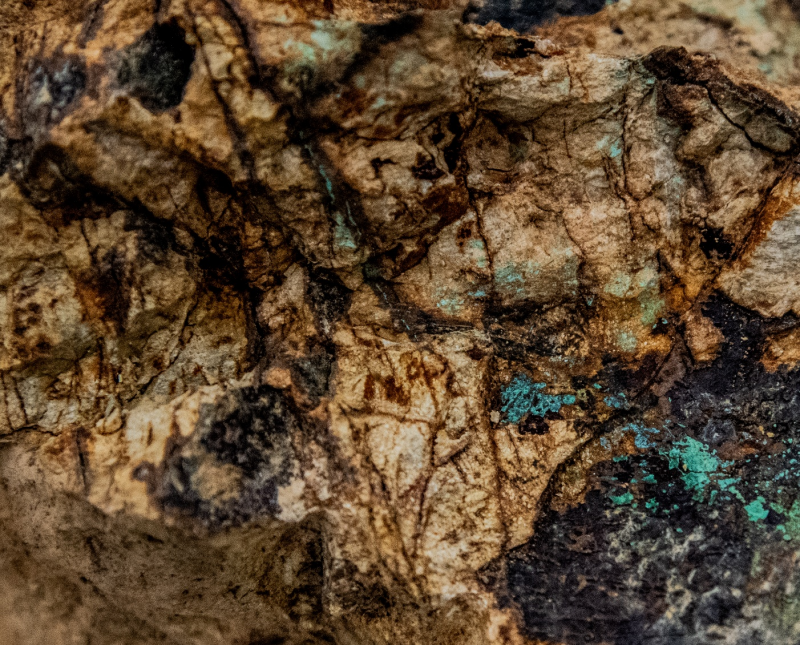
Click Image To View Full SizeFigure 6: Photograph of typical example of malachite mineralized argillic altered stockwork material taken from the northern end of TR02.
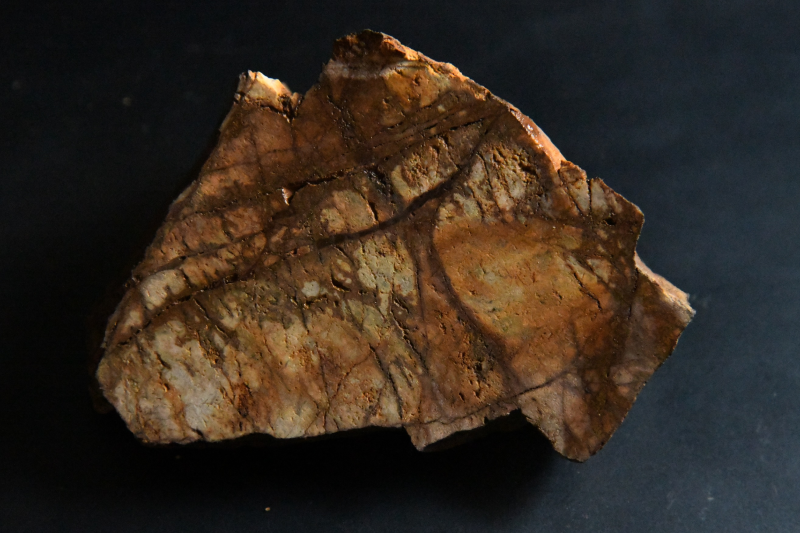
Click Image To View Full SizeFigure 7: Photograph of typical example of silicified leached portion of the limonite stockwork material taken from the center of TR02.
Sample Collection, QA/QC, Preparation and Analysis
Trenches were opened using a mechanical excavator, clearing surface cover down to bedrock or consolidated sub crop between 0.5 – 1.75 meters depth, measuring approximately 0.5 – 0.75 meters in width. Cross cutting E-W striking trenches were limited in length by increasing amounts of surface cover to the east and west of the main trend. Trenches were systematically sampled at 1.5-meter intervals, via a continuous 10 x 10cm channel across the entire trench floor. Representative sample intervals were then photographed, logged and bagged by Electrum geologists.
An Electrum geologist placed the material from each 1.5meter channel interval into uniquely labeled calico sample bags, verifying the interval against pre-labeled depth markers along the trench wall. Each sample was then photographed and logged. The trench floor was logged on a field sheet, detailing alteration type, vein density, vein type, gangue mineral content, ore mineral content, lithology, and structural data where available. Once collected, samples were sealed with single-use zip-lock ties and delivered to the company’s sample storage facility, where they were batched and subsequently submitted to SGS.
The trenches were surveyed by an independent professional surveyor, using high accuracy Trimble R980 gps unit, with a nominal accuracy of 5 cm.
Samples were analyzed using a combination of four-acid digest with an AAS finish for copper and 50g fire assay with an AAS finish for gold analysis. Samples were submitted in batches of 40, made up of 38 samples, one CRM, and one blank. All batches passed QAQC Samples were be prepared and analyzed at SGS Serbia & Bulgaria (certification SRPS ISO / IEC 17025).
Given the bulk nature and potential sulphide leaching of the limonite stockwork material sampled, a cut-off grade of 0.05% Cu and 0.1 g/t Au was used to calculate the reported trench intercepts with a maximum of 3 meters continuous internal dilution.
About Electrum Discovery Corp.
Electrum Discovery Corp. is an emerging mineral exploration and development company focused on the prolific Western Tethyan Belt with two main projects spanning 645 square kilometers of prospective exploration ground in the Republic of Serbia.
-
Timok East extends over 123 square kilometers across the Timok copper-gold region and includes the recently discovered Bambino copper-gold anomaly, located less than five kilometers from the Bor Copper-Gold Mining Complex.
-
Novo Tlamino, located in the south-east of the Republic of Serbia, covers 522 square kilometers and includes an inferred mineral resource estimate of 670,000oz AuEq (7,100,000t at 2.9 g/t AuEq average grade), PEA (January 7, 2021)1
Electrum Discovery is looking to maximize the value of our mineral projects for all stakeholders including our shareholders, the local community and government. We have an open-door policy and encourage all stakeholders to contact us through our website. We have a strong environmental and ethics policy to complete all our work in line with regulations in an open and transparent process. Our projects are at an early stage, and we plan continue our consultation with all stakeholders in a climate of mutual respect, while fostering sustainability, governance and knowledge transfer in the region.
Additional information on Electrum can be found by reviewing the Company’s page on SEDAR+ at www.sedarplus.ca.
For more information contact:
Dr Elena Clarici, Chief Executive Officer and Director
T: +1 604 801 5432 | E: [email protected] | W: electrumdiscovery.com
Qualified Person
The scientific and technical contents of this news release have been reviewed and approved by R. Michael Jones P.Eng . Mr. Jones is a non-independent Qualified Person as defined by NI 43-101 and a director of the Company. He has visited the property several times and verified the data gathered by technically competent experienced staff by reviewing, the assay certificates, the QAQC procedures and reports of company and lab samples, the geological data and interpretation and reviewing the qualifications of the persons completing and compiling the field work.
Neither the TSX Venture Exchange nor its Regulation Services Provider (as that term is defined in the policies of the TSX Venture Exchange) accepts responsibility for the adequacy or accuracy of this release.
Forward-Looking Statements
Certain statements contained in this news release constitute “forward-looking information” within the meaning of Canadian securities legislation. All statements included herein, other than statements of historical fact, are forward-looking information. Such statements include Company’s expected achievement of specified milestones, results of operations, and expected financial results of the Company. Often, but not always, this forward-looking information can be identified by the use of words such as “estimate”, “estimates”, “estimated”, “potential”, “open”, “future”, “assumed”, “projected”, “used”, “detailed”, “has been”, “gain”, “upgraded”, “offset”, “limited”, “contained”, “reflecting”, “containing”, “remaining”, “to be”, “periodically”, or statements that events, “could” or “should” occur or be achieved and similar expressions, including negative variations.
Forward-looking information involves known and unknown risks, uncertainties and other factors which may cause the actual results, performance or achievements of Electrum, to be materially different from any results, performance or achievements expressed or implied by forward-looking information. Such uncertainties and factors include, among others, uncertainties inherent in the PEA and exploration results and the estimation of mineral resources; risks related to the failure to obtain adequate financing on a timely basis and on acceptable terms; changes in general economic conditions and financial markets; risks associated with the results of exploration and development activities, and the geology, grade and continuity of mineral deposits; unanticipated costs and expenses; and such other risks detailed from time to time in Electrum’s quarterly and annual filings with securities regulators and available under Electrum’s profile on SEDAR+ at www.sedarplus.ca. Rock chip and surface results are early stage and there is no assurance that future exploration will find mineralization of further interest. Although Electrum has attempted to identify important factors that could cause actual actions, events or results to differ materially from those described in forward-looking information, there may be other factors that cause actions, events or results to differ from those anticipated, estimated or intended.
Forward-looking information contained herein are based on the assumptions, beliefs, expectations and opinions of management. Forward-looking information has been made as of the date hereof and Electrum disclaims any obligation to update any forward-looking information, whether as a result of new information, future events or results or otherwise, except as required by law. There can be no assurance that forward-looking information will prove to be accurate, as actual results and future events could differ materially from those anticipated in such information. Accordingly, investors should not place undue reliance on forward-looking information.
1 Preliminary Economic Assessment and NI43-101 Technical Report for the Medgold Tlamino Project, January 7, 2021, www.sedarplus.ca. The effective date of the resource estimate is January 7, 2021. Authors of the Reports are: Mr. Richard Siddle, MAIG, of Addison Mining Services Ltd for Mineral Resources; Dr. Matthew Randall, FIMMM, of Axe Valley Mining Consultants Ltd for Mining; Mr. Ian Jackson, FIMMM, of Bara Consulting for Mineral Processing, and Dr. Andrew Bamber, MCIM, of Bara Consulting Ltd for Economic Analysis.
The PEA is preliminary in nature, and it includes inferred mineral resources that are considered too speculative geologically to have the economic considerations applied to them that would enable them to be characterized as mineral reserves, and there is no certainty that the PEA will be realised.
Copyright (c) 2024 TheNewswire – All rights reserved.

